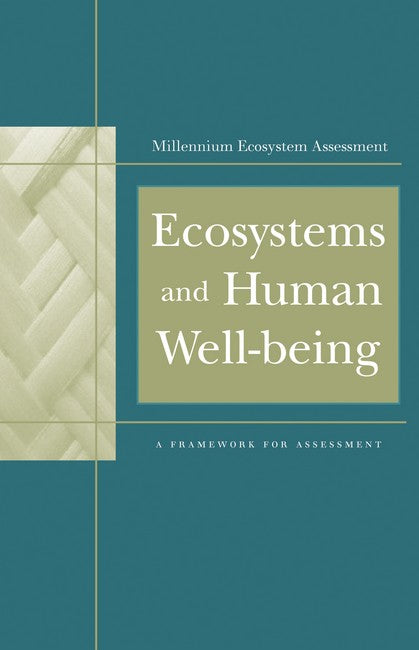Table of Contents
Preface
Acknowledgments
Summary for Decision-makers
Chapter 1. Introduction and Conceptual Framework
1.1 Introduction
1.2 Overview of Conceptual Framework
1.3 The Multiscale Approach
1.4 Types of Knowledge Assessed
1.5 Minimizing Structural Biases
1.6 Use in Decision-making
Chapter 2. Ecosystems and their Services
2.1 Introduction
2.2 Ecosystems Boundaries and Categories
2.3 Ecosystem Services
Provisioning Services, Regulating Services, Cultural Services, Supporting Services, A
Multisectoral Approach
2.4 Biodiversity and Ecosystem Services
2.5 Ecosystem Condition and Sustainable Use
Flows of Provisioning Services, Condition of Regulating, Cultural, and Supporting Services,
Variability, Resilience, and Thresholds in Services, Ecosystem Health and Other Related
Concepts, Substitution of Services
Chapter 3. Ecosystems and Human Well-being
3.1 Introduction
3.2 Key Components of Human Well-being
3.3 Linkages Between Ecosystem Services and Human Well-being
3.4 Substitutability and Well-being
3.5 Balancing Priorities: Present Versus Future
3.6 Institutions and Freedoms
3.7 Conclusion
Chapter 4. Drivers of Change in Ecosystems and their Services
4.1 Introduction
4.2 Previous Approaches on the Factors of Change
4.3 Drivers: An Overview
4.4 The Decision-maker Within the Ecosystem
4.5 Ecosystem Consequences of Decisions Outside an Ecosystem
4.6 Drivers of Ecosystem Change
Demographic Drivers, Economic Drivers, Sociopolitical Drivers, Scientific and Technological
Drivers, Drivers Determined by Cultural and Religious Values, Physical, Biological, and
Chemical Drivers
4.7 Interactions Among Drivers
Chapter 5. Dealing with Scale
5.1 Introduction
5.2 Why Scale Matters
5.3 Changing Scales
5.4 Space and Time Domains
5.5 Inertia in Human and Ecological Systems
5.6 Viewing a Particular Scale in Context
5.7 Scales in Ecological and Human Systems
5.8 Scale and Policy
Politics of Scale, Institutional Fit and Interplay
5.9 Guidance for Multiscale Assessments
Choosing the Appropriate Scales, Resolutions, and Boundaries, Integration Across Scales
Chapter 6. Concepts of Ecosystem Value and Valuation Approaches
6.1 Introduction
6.2 The Utilitarian Approach and Economic Valuation Methods
Motivations for Economic Valuation, Total Economic Value, Economic Valuation Methods,
Putting Economic Valuation into Practice
6.3 Non-utilitarian Value
Sociocultural Values, The Intrinsic Value Paradigm, The Interactions of Political and Market
Metrics
6.4 Conclusion
Chapter 7. Analytical Approaches
7.1 Introduction
7.2 Data
Challenges in Using Data, Data Quality Assurance, Indicator Selection
7.3 Units of Analysis and Reporting
Ecosystem Boundaries, Relating Ecological and Human-centered Units, Reporting Units
7.4 Modelling Issues
Environmental System Models, Human System Models, Integrated Models
7.5 Scenario Analysis
Scenarios for Ecological Services, Review of Scenario Types and Approaches, The MA
Approach to Scenario Analysis, Models to Support Scenario Analysis
7.6 Overarching Issues
Matters of Scale, Review and Validation Procedures, Analysis of Uncertainty
7.7 Conclusions
Chapter 8. Strategic Interventions, Response Options, and Decision-making
8.1 Introduction
8.2 Decision-making Processes
8.3 Response Options and Strategic Interventions
8.4 Usable Knowledge
8.5 Dealing with Risk and Uncertainty
8.6 Decision Analytical Frameworks and Tools
Appendix 1. Chapter Responsibilities
Appendix 2. Reviewers
Appendix 3. List of Acronyms
Appendix 4. Glossary
Sources
Library of Congress Subject Headings for this publication: Human ecology, Ecosystem management

